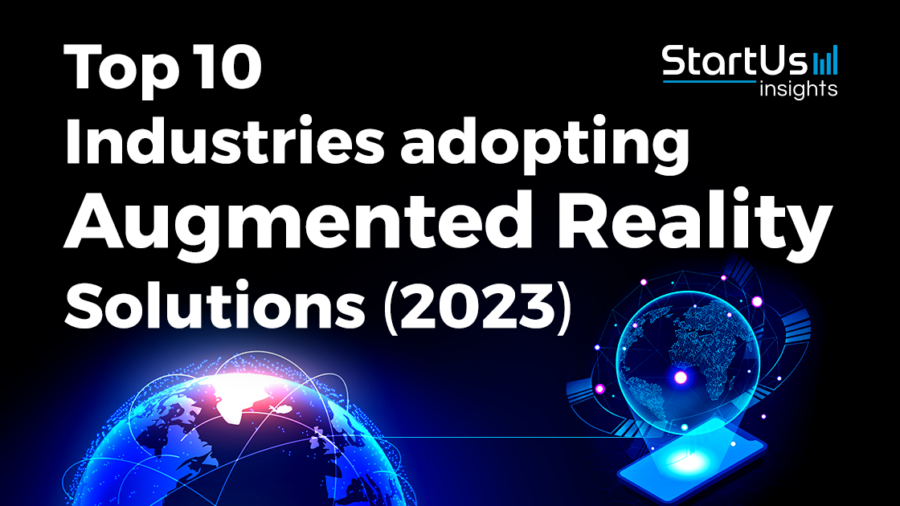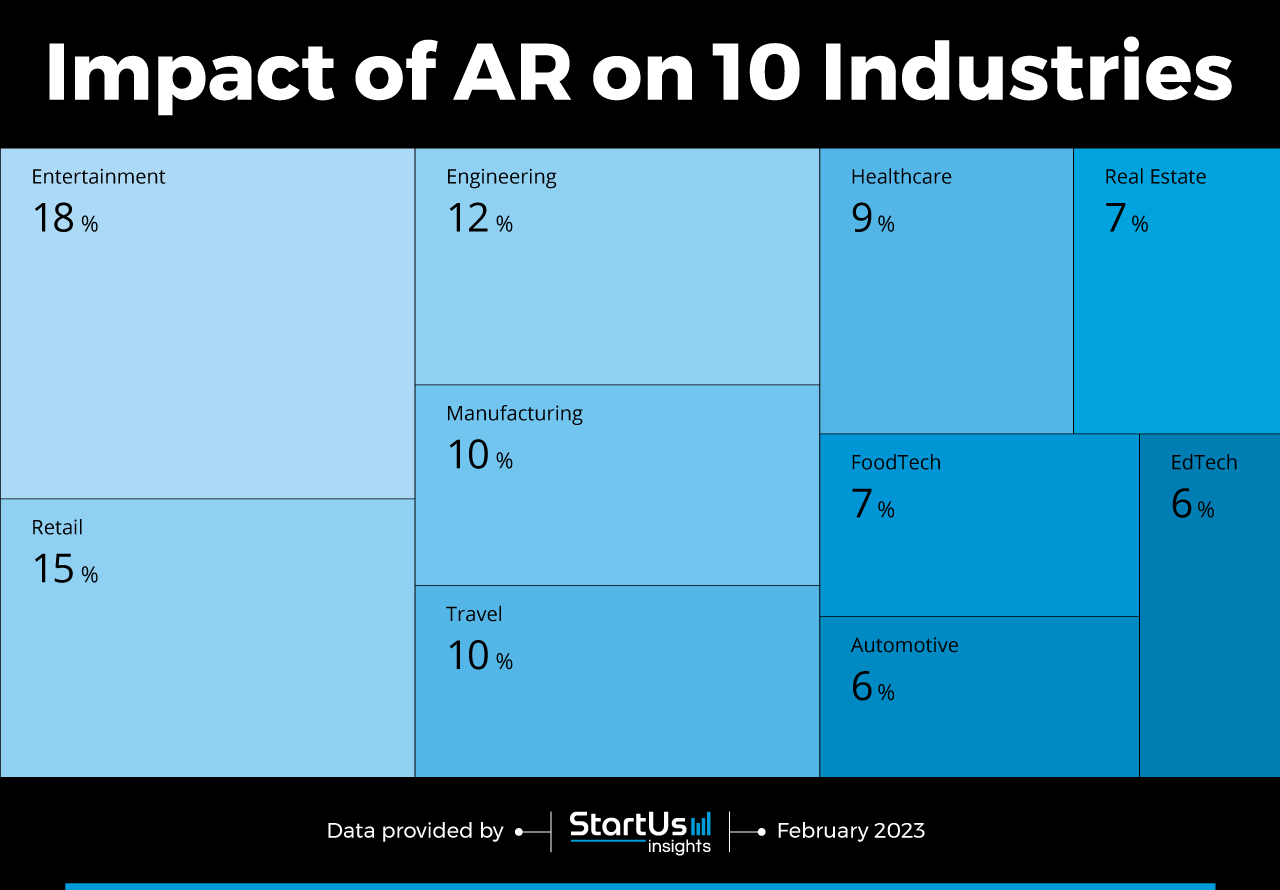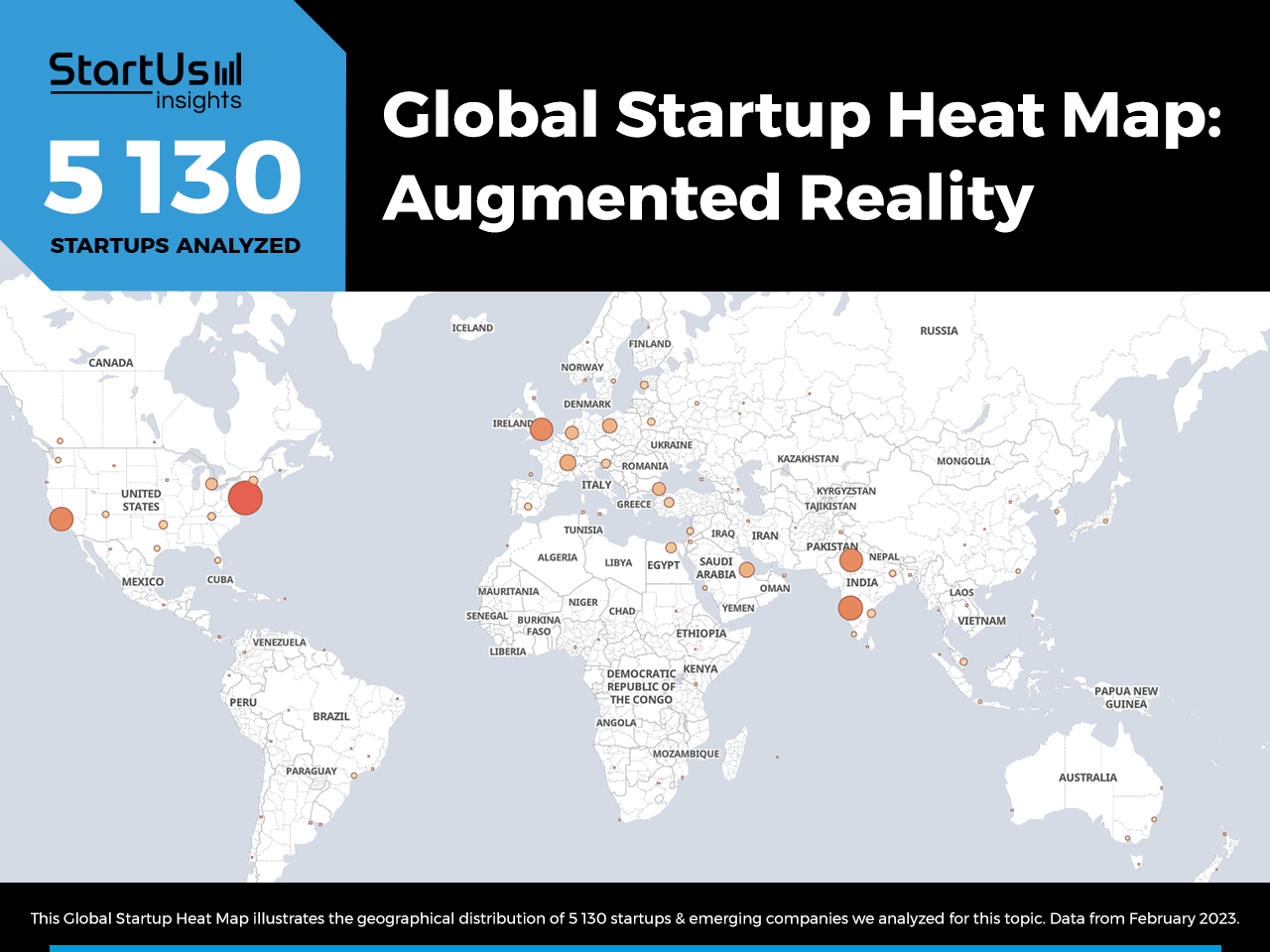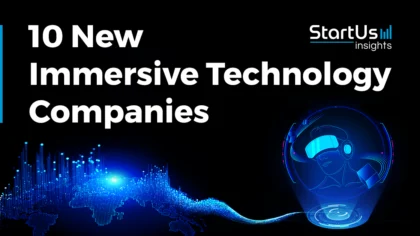Mass adoption of connected devices offers advanced insights into various operations and processes. AR aggregates and provides this data through displays, allowing users to leverage it in real life and enhancing overall efficiency. We give you data-driven innovation insights based on our analysis of 5130 AR startups & technologies so that you do not miss out on emerging visualization solutions. Unlike virtual reality (VR), AR does not need specific hardware, accelerating its adoption. Read more to explore the top augmented reality examples across 10 industries and how they advance your business.
Tree Map reveals the Top 10 Augmented Reality Applications across 10 Industries
Based on the Innovation Map, the Tree Map below illustrates the top examples of AR across 10 industries in 2023 and 2024. The entertainment industry sees the most activity in the augmented reality sector as filmmakers, game developers, and other segments in the industry develop novel means to deliver immersive content. At the same time, retail, travel, real estate, and food industries leverage AR to enhance customer engagement while improving marketing and sales opportunities.
The manufacturing sector uses AR to advance maintenance and production line operations. AR in engineering, on the other hand, accelerates product development through live visualization. Lastly, the healthcare industry leverages AR to aid surgical decisions and training, whereas edtech uses it to enable interactive and immersive learning experiences.
Global Startup Heat Map covers 5130 AR Startups & Scaleups
The Global Startup Heat Map below highlights the global distribution of the 5130 exemplary startups & scaleups that we analyzed for this research. Created through the StartUs Insights Discovery Platform that covers 3 790 000+ startups & scaleups globally, the Heat Map reveals that the US has a high concentration of AR startups, followed by India and Europe.
Below, you get to meet 10 out of these 5130 promising startups & scaleups as well as the solutions they develop to advance the applications of augmented reality across various sectors. These AR startups are hand-picked based on criteria such as founding year, location, funding raised, & more. Depending on your specific needs, your top picks might look entirely different.
Top Examples of Augmented Reality across 10 Industries in 2023 & 2024
1. Entertainment
The popularity of AR-based games like Pokemon Go significantly impacted its adoption in the gaming industry. While a significant portion is limited to mobile games, AR is now a hot topic among console and computer gaming communities. On the other hand, the entertainment industry has been using AR for public relations and marketing for a while.
However, the wide acceptance of interactive movies, like Black Mirror: Bandersnatch, is causing interest among film and game studios in integrating AR into video content. Other entertainment segments like music and theater art firms also utilize AR to expand their reach among potential customers and increase revenue.
Wireshape accelerates 3D Model Pipelines
Wireshape is a US-based startup that speeds up 3D model pipelines for AR workflows. The startup uses 3D scanning, postcapture processing, and quad topology to capture real-life objects. Moreover, it offers 3D models tailored for AR through real-time standard format and features accurate seams and color depth. This allows game developers and filmmakers to enable lean and fast 3D model creation.
2. Retail
The retail industry leverages augmented reality to enhance customer experience. To achieve this, startups are developing AR-guided in-store navigation apps, interactive content formats, and product catalog visualizations, among others. By combining customer analytics, AR enables retailers to target customers and deliver accurate product recommendations.
Virtual try-on is another feature AR enables for retail companies, especially for eCommerce businesses. This allows customers to mitigate concerns around online purchases and leverage true-to-life product demonstrations, increasing conversion. Other AR solutions in retail include virtual fitting rooms, AR-enabled store windows, and more, all increasing brand awareness.
HoloNext facilitates AR Publishing
HoloNext is a Turkish startup that develops an AR designing and publishing studio platform. It allows retailers to create AR experiences without in-house development efforts. Users upload 3D content into the platform, edit them through a web-based interface, and then publish the AR content.
The platform also features a 3D content management system (CMS), multi-platform configurations, and webAR to deliver content. This, in turn, enables customers to overlay products in their personal spaces, increasing engagement and sales.
3. Engineering
Apart from aiding the training process for product assembly, AR in engineering simplifies part and product design. For example, engineers and designers leverage AR to visualize the final product from 2D drawings or computer-generated models. They are able to overlay the visualizations over real situations, and it accelerates design improvements and revisions.
Apart from that, AR-based solutions facilitate collaboration between engineers and design reviewers, speeding up product finalization. That is why startups are developing AR-based solutions tailored to the engineering industry. This way, engineers are able to avoid errors at early design stages, accelerating the time to market for new designs.
Onesight Technology offers an AR-based Construction Assistant
Onesight Technology is a Chinese startup that makes an AR-based construction assistant. It leverages cloud-based automatic building information modeling (BIM), point cloud, photogrammetry, and the internet of things (IoT).
The assistant uses these data points to provide indoor and outdoor centimeter-level positioning for on-site workflows. This offers visual reference and guidance to workers and enables engineers to quickly identify construction errors, reduce rework costs, and improve operational efficiency.
4. Manufacturing
The manufacturing sector leverages all AR-based tools in the engineering spectrum to speed up in-house product development. Further, it uses AR to offer live instructions to the operators working in production lines. This improves manufacturing line efficiency upon maintenance operations and machine breakdowns.
Moreover, it eliminates the need for continuous intervention and collaboration with safety and maintenance teams. Additionally, manufacturers extensively use AR-powered materials to train and upskill employees. Since this eliminates the need for practicing in production-ready machines, AR-based training reduces manual errors and unexpected downtimes.
SkillReal provides Live Work Instructions
SkillReal is an Israeli startup that creates AssistAR, a solution that offers live work instructions. It integrates into product lifecycle management (PLM) and manufacturing execution systems (MES) to collect operational data. AssistAR then retrieves work instructions and 3D models, eliminating manual errors.
This allows manufacturers to reduce expert interventions during assembly validation and maintenance operations as well as aids employee training and remote support. Consequently, SkillReal improves production line productivity, quality, and throughput.
5. Travel
Improving traveler experience is the primary use case of AR in the travel and tourism sector. Startups in this field develop AR-based navigation apps, tour guides, and locality information apps, among others. Such solutions allow travel companies, tourist destinations, and hotels to deliver interactive content and increase traveler engagement, creating a lasting impression.
AR also enables companies to offer tours and itineraries based on customers’ language preferences without massive capital expenses. Additionally, augmenting relevant information to travelers educates customers and increases conversion rates. Moreover, AR-powered ads increase the chances of conversion for events organized by hotels and travel companies as most tourists otherwise rely on online platforms for their travel plans.
Aryel enables AR-based Marketing
Aryel is an Italian startup that makes a software-as-a-service (SaaS) platform for AR-based marketing. It allows travel agencies, tourist attractions, and hotels to create interactive content. This includes AR-based route navigation and gamified tour guides that offer information relevant to the places tourists visit.
It also provides the content in their preferred language. Aryel, in turn, enables an additional engagement opportunity for travel companies with their customers, attracting new customers and increasing repeat sales.

6. Healthcare
Augmented reality impacts healthcare in three stages – medical education, medical imaging, and patient care. In contrast to book-based training, nurses and medical students leverage AR to better understand human anatomy and investigate various rare cases. This improves their performance at hospitals and enhances patient care.
At the same time, surgeons use AR to aggregate necessary information in a single point and to offer remote surgical expertise during surgeries. Unlike conventional methods, AR-assisted surgeries reduce the burden on physicians and increase surgical precision. Lastly, AR aids patients in describing symptoms, while it specifically helps visually impaired patients in recognizing faces, finding lost items, and navigating environments.
ARSPECTRA advances Surgical Navigation
ARSPECTRA is a Luxembourg-based medical technology startup that designs AR displays for surgical navigation. The startup’s product, CART 3D, replaces classic monitors with see-through AR displays. It provides patient data, surgical instructions, and medical images on the same screen and in the direct sight of surgeons. This enables physicians to avoid concentration-intensive diagnostic data mapping and instead rely on automatic delineations, improving precision during surgeries.
7. Real Estate
The COVID-19 pandemic accelerated the adoption of AR in real estate to offer immersive property viewings for remote and distributed buyers. This allows clients to tour multiple properties in a short time from anywhere in the world.
AR also provides better visualization opportunities for customers as they are able to view the final building condition even before starting the project. This increases customer engagement and, in turn, improves sales. While 2D mockups are not very well comprehensible for all customers, they are able to quickly grasp AR-based mockups. These solutions make the buyer experience more immersive and also assist agents in converting potential leads into actual sales more swiftly.
RealAR offers AR-powered Property Walkthroughs
RealAR is an Australian startup that provides AR-powered property walkthroughs. The startup combines AR and artificial intelligence (AI) to convert floor plans into walkthroughs. Moreover, RealAR’s process does not require additional hardware as the walkthroughs are accessible through smartphones.
Property management and real estate companies use this solution to offer virtual tours of their properties to prospective customers on-site or remotely, increasing customer engagement and conversion.
8. Food Tech
The food industry utilizes AR to offer real-time product information to consumers. They scan quick-response (QR) codes or labels through smartphone apps to gain visibility into supply chain information and ensure product authenticity.
Augmented reality also aids warehouse management as AR-driven workflows replace manual processes and supervision, reducing errors and wastage. Further, food brands use AR to deliver personalized marketing content to their consumers, increasing brand engagement and loyalty. These AR-based solutions, in turn, enable food companies to improve operational efficiency and revenue.
Smartbottle enables AR-based Brand Communication
Smartbottle is a French startup that provides AR smartphone apps for wine and spirit brands. The startup’s apps allow users to place digital content of their choice, including videos, comments, and awards, on existing labels.
This, in effect, enables beverage brands to broadcast marketing content to improve communication with consumers and increase brand loyalty. Since it does not require brands to change labels, Smartbottle’s solution reduces development costs and speeds up the time to market.
9. Education Technology
AR in the education sector increases accessibility to learning materials, especially since students are adopting online learning. Moreover, AR does not require dedicated hardware like VR solutions. This allows teachers to quickly develop AR-powered educational content and increase learner engagement and interest.
Interactive solutions make learning more enjoyable and improve the pedagogical experience. AR also enhances teacher-student collaboration through subject matter visualization. Further, some startups create AR-driven lab workflows that elevate the learning experience and performance.
Djinn Solutions advances Interactive Learning
Djinn Solutions is an Indian startup that offers immersive learning through an AR-based educational kit. It features 135+ physical cards and a mobile application that children use to view various animations. This promotes visual, auditory, and physical interactions among learners and stimulates the children’s sensory experience. The startup is also working on a mixed reality (MR) solution to enable immersive learning for the students.
10. Automotive
Automotive manufacturers integrate AR into navigation systems, along with heads-up displays (HUD), to improve passenger convenience and safety. The technology offers operational guidance through live instructions and remote support in production lines, improving automotive manufacturing efficiency and throughput.
AR further enhances marketing and sales efforts in the automobile sector. Vehicle dealers and brands use AR-powered solutions to offer virtual walkthroughs of vehicles for online and remote customers. Besides, such solutions improve customer convenience and engagement, increasing sales.
Avatar Digital aids Vehicle Marketing
Avatar Digital is a UK-based startup that develops AR apps for vehicle marketing. The startup’s product, Live Auto, allows car dealerships and brands to offer virtual models of their vehicles to prospective customers. They are able to explore the interior and exterior of the vehicles as well as virtually test drive vehicles. This enables car dealers and brands to increase conversion for online customers and build brand advocacy.
Discover All AR Startups
Augmented reality is the predecessor in integrating more immersive solutions across industries. This will drive the adoption of VR and mixed reality (MR) solutions that significantly improve the scope of immersive reality technologies. Even though startups are making AR accessible to consumers and businesses alike, many are developing advanced MR and VR solutions. These advances will increase operational efficiency across industries and improve customer engagement and satisfaction. Get in touch to identify specific AR startups & solutions that advance your business!








